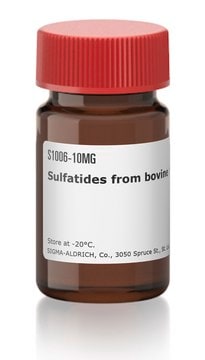857230P
Avanti
C18:1 LPA
1-(9Z-octadecenyl)-2-hydroxy-sn-glycero-3-phosphate (ammonium salt), powder
Synonym(s):
1-O-9-(Z)-octadecenyl-sn-glycero-3-phosphate (ammonium salt); PA(18:1(9Z)e/0:0)
About This Item
Recommended Products
Assay
>99% (LPA; may contain up to 10% of the 2-LPA isomer, TLC)
form
powder
packaging
pkg of 1 × 1 mg (857230P-1mg)
manufacturer/tradename
Avanti Research™ - A Croda Brand 857230P
lipid type
cardiolipins
phospholipids
shipped in
dry ice
storage temp.
−20°C
SMILES string
O[C@](COP([O-])(O)=O)([H])COCCCCCCCC/C=C\CCCCCCCC.[NH4+]
General description
Application
Biochem/physiol Actions
Packaging
Legal Information
Storage Class Code
11 - Combustible Solids
WGK
WGK 3
Flash Point(F)
No data available
Flash Point(C)
No data available
Certificates of Analysis (COA)
Search for Certificates of Analysis (COA) by entering the products Lot/Batch Number. Lot and Batch Numbers can be found on a product’s label following the words ‘Lot’ or ‘Batch’.
Already Own This Product?
Find documentation for the products that you have recently purchased in the Document Library.
Customers Also Viewed
Our team of scientists has experience in all areas of research including Life Science, Material Science, Chemical Synthesis, Chromatography, Analytical and many others.
Contact Technical Service












